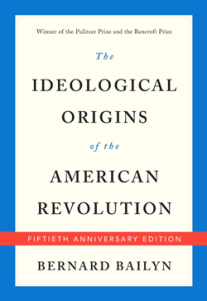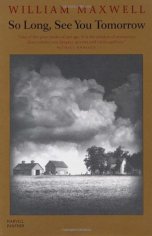Today, we conclude “The Ideological Origins of the American Revolution at 50″ roundtable with a guest post from Eran Zelnik. Zelnik is a PhD candidate at UC-Davis where he is writing “The Comical Style in America: Humor, Settler Colonialism, and the Making of a White Man’s Democracy, 1740-1840,” a dissertation that traces the rise of common white men to cultural dominance in early America.

In his classic study, The Great Cat Massacre, Robert Darnton captured what to me has always seemed as the moment when cultural or intellectual history becomes truly thrilling: “when you realize that you are not getting something—a joke, a proverb, a ceremony—that is particularly meaningful to the natives, you can see where to grasp a foreign system of meaning in order to unravel its meaning.” Fifty years later, Bernard Bailyn’s classic The Ideological Origins of the American Revolution still stands out in my mind as one of the prime examples of such a moment in the historiography of early America. His writing in that piece exudes the intellectual rush Bailyn and many of his students felt as they fleshed out a new promising analysis of what later came to be known as “republican” thought. Leafing through the book one can still feel the sense of excitement Bailyn shares with the reader as he explores the significance of hitherto little-understood intellectual traditions. It might seem counter intuitive for a junior historian with unambiguous leftist tendencies, but it is one of those few books that keep reminding me that history can be exciting.
Much as Darnton cast it, for Bailyn this exciting new interpretation of Revolutionary-era ideas hinged on unpacking certain phrases that did not fully make sense to the modern reader. As Bailyn notes, until then historians had usually explained away hyperbolic statements by Americans insurgents—such as referring to their treatment by British authorities with terms that included “tyranny” and “slavery”—as inflated propaganda. Surely American Revolutionaries did not really think of their condition within what even they often admitted was one of the most forward-looking regimes of the period as slavery, and surely they could not seriously consider legislation passed by the British House of Commons as tyranny. According to Progressive historians this was a facade that hid the real economic interests that lay behind the American Revolution, while another tradition accounted for these terms as clever propaganda.
After reading with fresh eyes the pamphlets from the period, Bailyn suggested that the answer lay elsewhere. Noticing that certain discursive trends in the writings of the pamphleteers of the period between 1760 and 1775 did not align with historians’ understanding of Revolutionary ideology until then, Bailyn traced them to a vibrant intellectual tradition usually known as “country,” “commonwealthman,” or “opposition” thought. As Bailyn related in the forward to the book, the more he followed these leads and immersed himself in a new system of meaning, the more he understood the full significance of the supposedly inflated rhetoric of the period. The Ideological Origins of the American Revolution was the result. Instead of hyperbole, Bailyn now cast slavery and tyranny as important symbolic nodes within a broader theory of power to which many in the North American British colonies subscribed.
To do so Bailyn borrowed from broader contemporary intellectual currents that offered promising new conceptual tools. Indeed, in retrospect what further stands out about Bailyn’s famous study is its willingness to engage with abstract concepts such as power and ideology and its dialogue with broader contemporary intellectual developments both in history and in other fields, especially anthropology. As one of the most central and long-standing studies in the historiographical cannon of early America one might write it off as stuffy and a bit dated, but in fact The Ideological Origins aged very well and makes for a much more clarifying and incisive read than many more recent studies of early America. It is, I think, this willingness to go out on a limb and theorize about ideology and power that makes it compelling still. While the historiography of early America often remains a bit aloof from broader intellectual trends and rarely forages too far afield for new insights, Bailyn’s classic suggests a more experimental spirit.
Though Bailyn did not provide a full exposition of the theoretical framework that underscored his study in the Ideological Origins itself, an article he published a few years later sheds some light on the broader intellectual context that inspired it. Clarifying how he understands the concept of ideology and how it figures in his scholarship, Bailyn provides the reader with a definition inspired by the work of anthropologist Clifford Geertz. Ideologies in this vein are “the shifting patterns of values, attitudes, hopes, fears, and opinions through which people perceive the world and by which they are led to impose themselves upon it.” “It is in these terms,” explains Bailyn, “that ideas… may be understood to have lain at the heart of the Revolutionary outbreak and to have shaped its outcome and consequences.” (1)
In my mind, Bailyn’s discussion of this ideology in the third chapter of The Ideological Origins as “a theory of politics” offers some of the most fascinating and insightful reads one can still find in the historiography of early America. It is here that his argument carries the most interpretive force and it is also where the reader gets the best feel for this system of meaning. It is also where his argument is most experimental and willing to wrestle with and pin down such a slippery notion as power. In fact, the greatest shortcoming of this study in my opinion is that Bailyn did not couch the concept of ideology within a theory of power as well; he did not take the notion of power seriously enough. Had he done so he would have found what he seemed to start getting at in the last two chapters of his book, that the ideology he traced intersected with broader social tensions. As we well know today, broader assumptions regarding race, gender, and class/status figured prominently in the ideological origins of the American Revolution. People take to ideas to a significant degree because it figures within the matrix of struggle over power in their society. And as Bailyn so well showed, ideologies provide the framework for these ideas to abide together, functioning as people’s interface with the world.
In recent decades the historiography of early America has become very good at atomizing and complicating. However, we have all too often done so at the expense of making strong and clear arguments that address intellectual problems of broader appeal. The Ideological Origins by contrast offers us some guidelines of how to circle back towards a broader argumentative scope. It suggests how historians can be good craftspeople and engaged intellectuals as well. We should be able to engage with and incorporate the work done in other disciplines. We should be willing to experiment with novel and often abstract concepts. As Bailyn showed, this need not come at the expense of good and rigorous scholarship. It does urge us, however, to relish the thrill of new revelations and interpretive epiphanies.
_______________
[1] Bernard Bailyn, “The Central Themes of the American Revolution: An Interpretation,” in Essays on the American Revolution, eds. Stephen G. Kurtz and James H. Huston (Chapel Hill: University of North Carolina Press, 1973), 11.
Spread the word:




